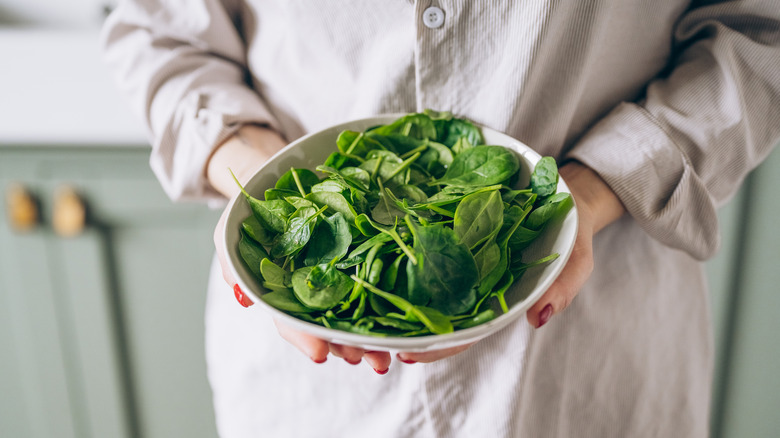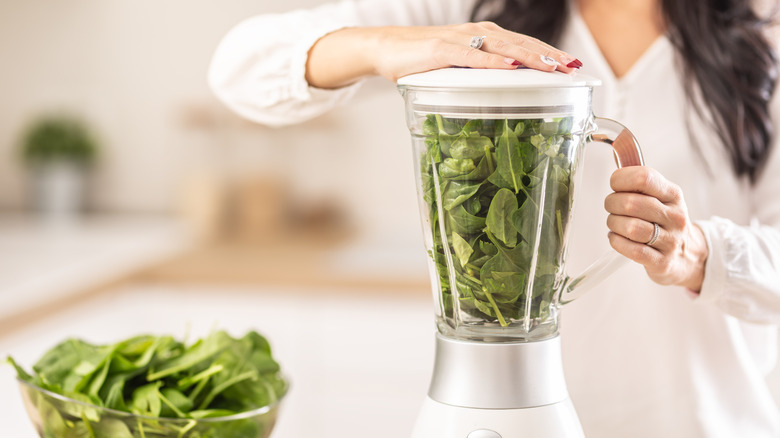
Your body requires daily iron to produce proteins in red blood cells and muscles that facilitate oxygen transport throughout the body. Iron is also crucial for maintaining a robust immune system, brain function, and thyroid health. Adult men and women over 50 need a minimum of 8 milligrams of iron daily, while women aged 19 to 50 require 18 milligrams due to menstrual blood loss. (Here are some foods to avoid if you have an iron deficiency.) Some of the richest sources of dietary iron include red meat, shellfish, poultry, beans, lentils, nuts, and seeds. Additionally, many breakfast cereals are fortified with iron.
However, don’t overlook vegetables. One leafy green, in particular, stands out for its iron content: spinach. Half a cup of cooked spinach provides 3.2 milligrams of iron, meeting 40% of the recommended iron intake for men and postmenopausal women, and 18% for women under 50. Spinach is also notably low in calories (approximately 21 per serving), with nearly 3 grams of protein and 2 grams of fiber. While Popeye’s belief in spinach for strength wasn’t unfounded, its nutrients may also reduce the risk of health conditions like cancer and high blood pressure.
Nutrients in Spinach That Control Blood Pressure and Prevent Cancer

Spinach is rich in beneficial electrolytes such as potassium, magnesium, and calcium, all of which support healthy blood pressure. One of its secret weapons might be its natural nitrates. Nitrates help relax blood vessels and improve blood flow, and spinach is abundant in them. A 2015 study in Clinical Nutrition Research had participants consume either spinach soup or asparagus soup every day for a week. When participants consumed the spinach soup, their arteries became less stiff just a few hours afterward. They also experienced significant reductions in blood pressure compared to those who ate asparagus soup. You might consider trying spinach juice to help lower your blood pressure (and protect against cancer, too).
Other nutrients in spinach may contribute to cancer prevention. According to a 2020 article in the Asian Pacific Journal of Cancer Biology, the vitamin C and vitamin E in spinach act as antioxidants, shielding your cells from damage caused by free radicals. Spinach also provides 131 micrograms of folate (about 33% of your daily value), supporting healthy cell division. People who consume folate-rich foods have a lower risk of colorectal cancer. Additionally, the magnesium and vitamins A and B6 in spinach help fortify your immune system and reduce inflammation, both of which play a role in cancer prevention.
A Few Downsides of Spinach

Spinach is rich in numerous phytochemicals, but some may not be beneficial. Spinach contains high levels of oxalate, an antinutrient that binds to minerals like calcium and magnesium. Oxalates can hinder your body’s absorption of these essential minerals. If your diet is low in calcium, consuming high-oxalate foods can increase the risk of calcium oxalate kidney stones. You can mitigate the effects of oxalate by drinking plenty of water and limiting sodium and sugar intake. Boiling spinach can also reduce the oxalate content. (Find out about the risks and benefits of raw vs. cooked spinach — and which is better for you.)
Spinach is also very high in vitamin K, with nearly four times the recommended daily amount. Vitamin K is crucial for blood clotting, and the National Institutes of Health states that most people get sufficient amounts through food. However, if you are taking the blood thinner warfarin, it’s important to maintain consistent vitamin K intake. Large fluctuations in vitamin K intake, such as consuming a large serving of spinach all at once, can interfere with the medication and increase the risk of blood clots.
People with gout may also be concerned about spinach due to its high purine content, which breaks down into uric acid. High uric acid levels can trigger gout flare-ups. However, the American Heart Association suggests that spinach is unlikely to significantly increase the risk of a gout attack.
“`




